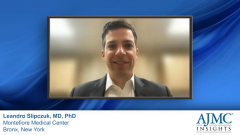
Utilizing Quality Metrics in ASCVD
Dr Slipczuk explores quality metrics, elaborating on ways to improve and align them with the latest cardiology treatment guidelines and payer considerations.
Episodes in this series

Leandro N. Slipczuk, MD, PhD: We’re still not fully aligning the metrics with the guidelines. Every patient coming for a recurrent event or a recurrent PCI [percutaneous coronary intervention]. Even if it’s the first PCI, we don’t have a level. But if they’re coming for a recurrent PCI or they have a recurrent event, and we haven’t reached the levels for the lipids, that should be a quality metric because there’s something failing. That doesn’t mean the hospital system or the hospital network is failing. This is a multifactorial problem. Blaming it purely on the institution or the doctors isn’t the right approach. If we don’t see the value and we don’t put it as a quality metric, then we’re failing to acknowledge the importance of lipids in coronary disease and ASCVD [atherosclerotic cardiovascular disease].
We’re lagging in the lipid world and in secondary prevention when we compare it with heart failure. There’s a lot of work to do, but we are reaching momentum. There’s a lot of research coming on this, and there are a lot of new data coming and a lot more options. I’m optimistic about what’s going to happen in the next few years.
The alignment of what you reward as a policy and what you reward in quality metrics to hospitals makes a difference. Whatever you reward will have higher likelihood of being accomplished. This can be done in different ways. It can be done by rewarding or by penalizing. That’s a lot more complex as we get into it. In some way, the proper therapy for lipids and the prevention have to be rewarded.
We were just having a conversation about a lecture series with Dr Valentin Fuster the other day. He was commenting on how there’s a transition from rewarding more interventions to rewarding more prevention. This is seen in how NIH [National Institutes of Health] grants are rewarded, and even more grants for research on plaque and into optimization primary and secondary prevention. Stents and heart transplants are important, and we highly appreciate that. But they’re for the right patient at the right time. If we can avoid that, we should. If medications reach a level where we can treat patients and avoid having someone with 7 or 10 stents, we must reward that first. We have to grow interest in that as a community.
This transcript has been edited for clarity.
Newsletter
Stay ahead of policy, cost, and value—subscribe to AJMC for expert insights at the intersection of clinical care and health economics.











